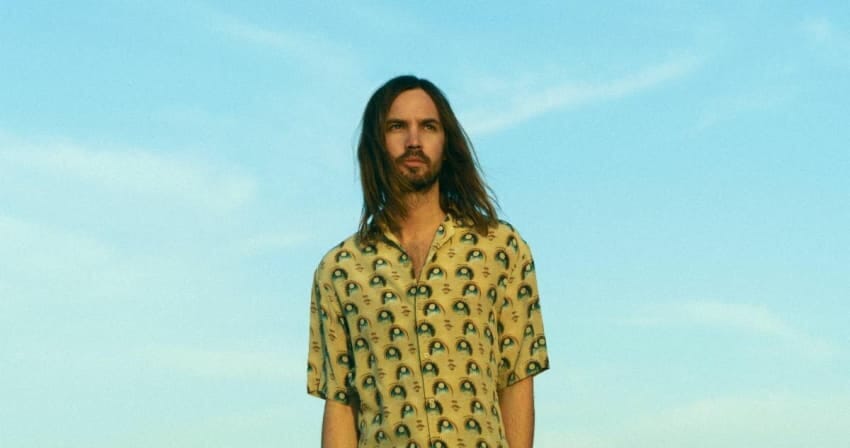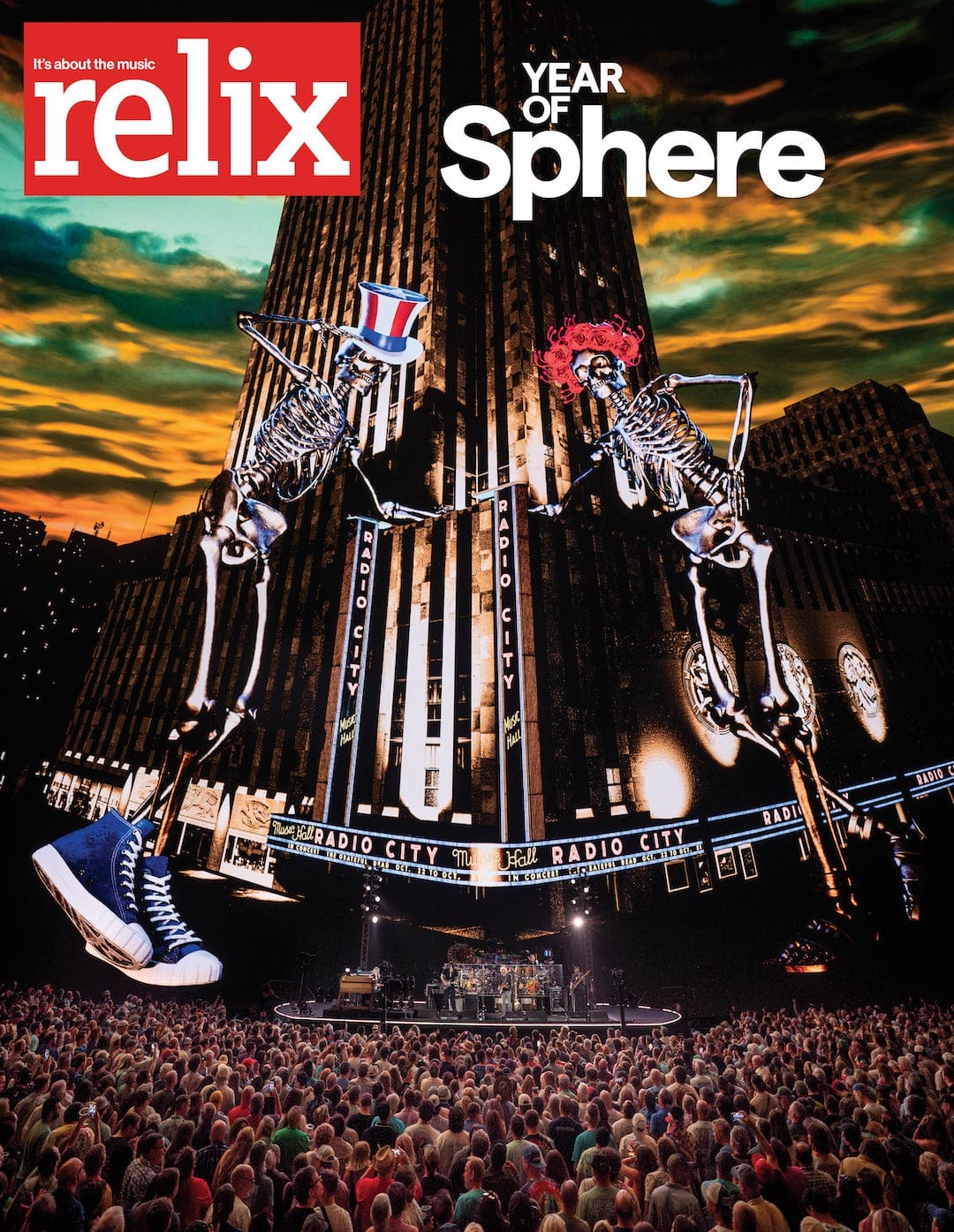Tame Impala: The Perks of Being A Loner

I find myself standing outside the Tribeca Grand Hotel in New York City, feverishly smoking a cigarette as I look over my notes one last time before sitting down with the Australian psych rock group Tame Impala. They’re in town to play a one-off show at the Brooklyn buzz-band mecca, Music Hall of Williamsburg, before heading to São Paulo to kick off a world tour that will stretch into the winter months. I’m hoping to discover, at least part of, the story behind this Aussie band that is quickly (and rather surprisingly) becoming one of the top acts on the scene today.
The hotel reveals itself to be most elegant place that I have ever conducted an interview. Everything from the hip-yet-classic styles worn by the doormen to the 20-something fashionistas that crowd the lobby says that this won’t be a typical Q&A. Within a small enclave of the hotel’s lounge, I find not a band but one man. In a lofty leather chair that probably cost more than the production on Tame Impala’s first album, I find guitarist and vocalist Kevin Parker sitting cross-legged, staring off into the hotel’s atrium.
He looks a bit like how you might imagine him: a mid-20s, longhaired surfer-dude wearing a bright green Teenage Mutant Ninja Turtles T-shirt that he often adorns onstage. Coolly ordering a cappuccino from the vested server, it’s as though he’s been ordering high-end coffee in five-star hotels all his life – I order a double scotch – and we settle into some questions about Tame Impala’s genesis on the distant shores of Perth.
I ask Parker about his band’s rapid rise to success, and about their debut album Innerspeaker and the recently released follow-up Lonerism both topping various indie rock charts. He answers the questions almost routinely and it’s clear that he’s already sat through several interviews of this nature since the day began.
But that’s also a subject I bring up – what is it about his brand of psychedelia that has crossed over to the masses? Why was there a hawkish music journalist in this seat before me? Why are we in this posh hotel? For a style of music that is not always friendly to the ears of the everyday listener, how is it that this band’s acid-drenched songs have managed to draw such a large appeal? Perhaps, as Arthur magazine’s Jay Babcock theorizes, it is because people often turn to music of a psychedelic nature following times of war, disaster and turmoil. Whatever it is, Parker’s music has caught on.
“That’s one of the hopes for what Tame Impala achieves in music – that it’s meant to be fucked up and weird and make people feel a bit woozy in a psychedelic way, but at the same time, be simply pleasing,” he says. But to understand the genius behind what is arguably one of the greatest psychedelic rock bands since the genre’s heyday, one must know a bit about thehistory behind its driving force.*
Kevin Parker was born in 1986 in Sydney and soon moved to Fremantle, a small harbor town just outside Perth, where he learned to play guitar from his father, a performer in a local cover band that played songs by bands such as The Beatles, The Beach Boys and Supertramp. After discovering Michael Jackson on a cassette player owned by his brother, Parker began creating his own music. And so began his foray into the world of home recording.
“When I was about seven, I decided I was going to write my own song,” he says. “It was only 30 seconds long and it was terrible, but I remember feeling an immense sense of satisfaction from it. Fast forward to where I properly wrote some sort of song and it became this thing where nothing else could affirm my life as much as the feeling of just having created something.

“For me, the idea of creating music seemed to come from a different place than listening to music. It’s only recently that I’ve started to be able to make the music I listen to. Originally, I listened to music like Silverchair or Smashing Pumpkins, but I didn’t know how to recreate it, all I knew how to do was play drums and smash the keys on my dad’s Casio keyboard. There was a complete disconnect between listening and creating.”
Parker had taken up drums when he was 11 and started recording drum loops while overdubbing guitar lines. Not long after, he began experimenting with various lo-fi recording techniques like setting up dual tape recorders and multi-tracking himself over it.
At age 16, he purchased what would become the foundation of Tame Impala – an 8-track recorder – and began writing Blue Cheer-esque prog tunes to perform around the local pub scene. Instead of excelling in school, hanging out or playing sports with the neighborhood kids, he spent the better part of his time alone, crafting songs in his parents’ garage.
“I was just pressing record on a tape machine and fiddling around on the thing until I was able to produce any kind of sound,” he admits. “Obviously, I’ve slowly gotten better at creating stuff that’s actually listenable, but at the same time, I love the way that, even today, I try to make a recording that’s good-quality and radio friendly but I just can’t do it.”
Gradually, Parker learned to transfer the psychedelic ‘60s-style songs he was hearing in his head onto the 8-track recorder, where he continued his experiments by – as he continually calls it – “fucking with” the songs.
Instead of studying scales or recording methods, Parker learned his craft mainly through experimentation. As Albin Zak explains in his book The Poetics of Rock, recording “includes many skills and sensibilities not traditionally associated with musical composition.” These are the skills Parker focused on, which would lead him to develop his unique approach to home recording.
“I never studied anything in the realm of recording, I could never really be bothered,” he tells me. “Each time I did something, I was satisfied with it for what it was; it was just this piece-of-shit recording, but it was my own thing. It was my baby, so I was never looking to get better.”
Over time, Parker developed a personalized songwriting style largely based around his tendency to record alone. To this day, he records all of his music by himself and continues to carry around a recorder on the road to capture any idea that might happen to pop into his head. “Tame Impala has always existed – not necessarily with that name but since I’ve been doing recordings on my own,” Parker reveals. “There’s no real difference to how a Tame Impala song is constructed now to how it was when I was 12 years old. In fact, I’ve found it to be the most creatively rewarding when I go back to the methods where I didn’t know how the fuck to record anything. I make songs in my head – and out of sheer fear of forgetting them or having them drift off into the forgotten subconscious – I find some way to store them.”
In 2005, Parker formed the psychedelic blues band The Dee Dee Dums, which grew to include friends Dominic Simper, Jay Watson and Nick Allbrook. All those collaborators would later form the basis of Tame Impala’s live band. “We’d have four songs in a 40-minute set and we’d essentially jam for most of it,” he says. “Those were the fun, free days of doing psych-rock jams for 10 minutes.”
Around the same time, he fell in with a group of musicians that existed in and around the local Perth music scene, including some of the members of Tame Impala brother band Pond as well as numerous other projects including the now defunct psych rock bands Mink Mussel Creek and Space Lime Peacock.
“We’re all best friends and even before there was Tame Impala we made music together in different bands,” he says. “We became this gigantic group of people that live and play music together. We’ve been doing it for five, six, seven years. Tame Impala existed within that. I’m totally influenced by the other guys musically.”

Parker eventually began using the Tame Impala moniker, referring to a vision he had of an impala, an African antelope, in the wild. “It’s like seeing an animal in this wild, crazy environment and you just suddenly have this brief unspoken connection. The animal is briefly tame. It’s not like you’re petting it – it’s just standing there, and you have this weird moment as though there’s some weird psychic connection between you and the whole world of animals.”
But after being deterred from a life of music by the same father who had bought him his first guitar, Parker went off to engineering school where he continued to write and record music in his dorm room. Around this time, he experienced a major musical turning point when he saw The Flaming Lips at the Summer Sonic Festival in Osaka, Japan.
“I happened to be on acid at the time,” he says candidly. “The thing that they’re driving toward – I find that I’m driving toward the same thing. So that changed me.”
This helped to inspire the psychedelic, stadium-sized sound that Parker sought to create as well as some of the visual elements that he would later bring to the live performance.
He eventually created a Tame Impala MySpace page and uploaded several songs to it that were dormant for years.
“One of the biggest songs, or the one that has the most hits on YouTube, ‘Half Full Glass of Wine,’ was sitting on MySpace for four years. Anyone could download it, just click fucking download. Then a label contacted me and said, ‘Do you want to release something?’”
While en route to a final exam in college, he got a call offering him a deal by Modular Recordings, a rising Australian record label, which he accepted. He turned around from the exam before his pen ever hit the paper. Parker went on to send a collection of about 20 songs to Modular, some of which were released as Tame Impala’s self-titled EP in September of 2008.
In 2010, Modular put out the group’s debut LP, Innerspeaker – a modern-day psychedelic masterpiece with Parker’s Lennon-esque vocals coasting above a perfect combination of paisley pop and expansive fuzzed-out guitar journeys – which topped many “best albums of the year” lists and won numerous awards.
Parker tells me that Tame Impala is, to a large degree, private to the point where he has trouble sharing his lyrics with his own bandmates. He says that he functions best when he’s left by himself to let his creativity flow – a theme that appears frequently in his songs.The title and many of the songs on Innerspeaker come from the perspective of a loner fully content with his own isolation. As Parker sings on the aptly titled album track “Solitude Is Bliss,”
“There’s a party in my head and no one is invited, and you will never come close to how I feel…movement doesn’t flow quite like it does when I’m alone.”
As a result of his fondness for alienation, he tends to shy away from conventional recording studios, preferring to enter the studio only in order to finalize the mastering process. This is also the only part of the process where he works with another individual, in this case acclaimed Flaming Lips producer Dave Fridmann.
“Sonically, the way I work with David is that he’s the mixing engineer,” Parker says. “He holds back his creative, producer tendencies, basically. He’s the role of the mixer. He’s physically making possible what I’m trying to do in terms of putting all the sounds together.

“The idea of organizing time to go into a studio – days and weeks – it freaks me out,” he admits. “I couldn’t imagine being creative in a studio setting. It just has to be whenever. There’s no real band, so for me to go into a studio is just going to be me in a studio. I like making music when the opportunity arises. I think it’s just that I’ve grown up doing it that way.”
The theme of alienation reappears even more openly on Tame Impala’s recent sophomore LP, Lonerism, which Parker began working on before the debut album was even finished. When I ask him about the title of the album, he immediately turns shy, reminding me just how special the content of this music is to him.
“It’s a word that I made up that sprung into my head that seems to describe the…oh fuck…what is it, I don’t know. Lonerism is about the process of realizing the outside world and seeing that you really don’t belong in it and how foreign it is to you,” he explains.
Lonerism is a step forward for Tame Impala, having broken away from many of the ‘60s and early-‘70s influences heard on the debut into something entirely its own. It’s a more contained, more confident translation of the music in Parker’s head and, in many ways, it’s even more “fucked” than the last one.
“With Innerspeaker, there was quite a concerted effort to try and channel these organic sounds into an electronic environment – to make it sound like it’s being sampled and then replayed. Whereas with Lonerism, there were no rules so I had no idea what it was going to sound like.
“I was playing around with a lot of synthesizers and I didn’t know if it was going to sound excessively ‘80s or what. There was definitely less thought. It was less about what is electronic and what isn’t – that was kind of forgotten. This time, I was going to use all the elements to try and combine my fetish for candy-pop melodies.”
Parker recorded the majority of it in a rented house in Perth as well as in an apartment in Paris, France, where he lived with his Parisian girlfriend. Once again, Friddman handled mixing duties, and aside from a lone track featuring band member Jay Watson, Parker wrote and recorded the entire album.
“It’s meant to be quite a child-like album where there are a lot of things that are done out of a basic, innocent desire to do them, sonically and lyrically,” Parker says. “The sounds are smashed into outer space because I felt like doing it. Some things are just totally first takes – I’ll literally vomit out a bass take. On ‘Apocalypse Dream,’ it’s just Jay playing piano at our friend’s house and me sticking a Dictaphone next to the piano. You can hear the metronome in the take. I get obsessed with the initial personality of the first take you do – it’s such an unreplicable thing that first take.”
Shortly after completing the album, Parker returned to Fremantle to begin working on the live versions of the Lonerism tracks with the rest of the band members – guitarist Dominic Simper, keyboardist Jay Watson, bassist Nick Allbrook and newly added drummer Julien Barbagallo – in preparation for their upcoming world tour.
“This tour is our first tour as a five-piece, so we’re getting into each other’s groove and reestablishing the psycho-kinetic connection between all of us,” Parker says. “It’s sounding better than it ever has and it feels better than it ever has. We’re just establishing what’s going on; then, we’ll be able to stretch out and stretch our legs, so to speak.”
When I ask Parker what it feels like going from playing small venues in Perth to playing for sell-out crowds and headlining major festivals, it once again feels like I’m asking too much.
“I try not to think about it,” he says. “It makes me think that the music that I love or my tastes aren’t that alien after all. I’m not that alone in my particular taste. It makes me feel like there are more people like me out there.”
In his own timidness, he seems to come to a realization about his view of himself as a loner. While Parker has often escaped into his “hole,” as he likes to call it, the messages hidden in his music have obviously connected with many people who share his feelings of isolation. It seems as though this crosses his mind as he stares up into the vast space of the hotel’s atrium. The light from above hits his face, and for a moment, he smiles as if he’s just made some sort of self-realization. After a momentary pause, he looks back down at me and continues.
“In a way, that’s kind of what this music is trying to do: establish a connection with other people that have that pessimistic view of themselves in the world, that feel like they are totally alienated and like there is something cosmically wrong with them, like they have some kind of curse existing among other people. This music is like a signal shooting out a message to those people.”



















